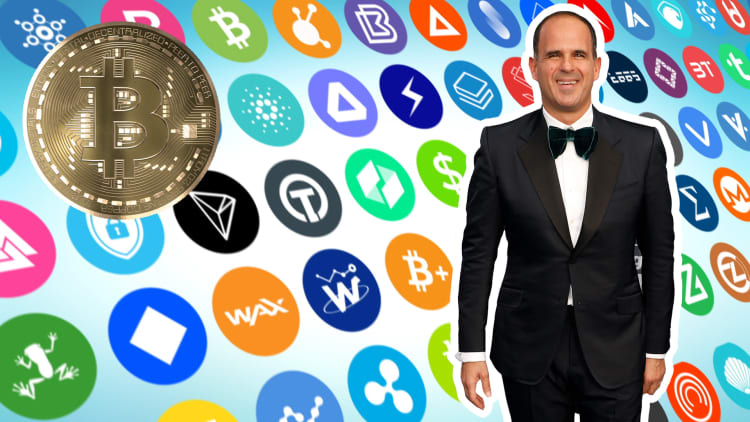Bitcoin captured the attention of investors, celebrities and even NFL players in 2017, as its price soared from below $1,000 for a single coin at the start of the year to over $19,000 in December.
The digital currency underpinned by blockchain technology — a decentralized ledger managed by a network of computers through complex math problems — has since fallen to trade near $6,430 at 10:00 a.m. EST Thursday morning according to Coindesk. For long term holders of bitcoin, that price is still a huge gain; a single coin was worth less than $100 in 2013.
However, it's important to remember that its value can fall all the way back to zero. In fact, there is a 0.4 percent chance bitcoin will become worthless, according to a new report by two Yale University economists.
"The current implied daily disaster probability is about 0.4 percent for Bitcoin, 0.6 percent for Ripple, and 0.3 percent for Ethereum," according to the report by Yale University economics professor Aleh Tsyvinski and economics Ph.D. candidate Yukun Liu.
By studying the price data for bitcoin from 2011 to 2018, along with that of Ripple's XRP and Ethereum's ether from the newer currencies' inceptions in 2012 and 2015 respectively, Tsyvinski and Liu were able to calculate the probability that the price of a cryptocurrency would drop to zero in a day. (The percentages are given as as risk neutral probabilities, which is a common financial calculation used to determine the expected values of assets.)
To give context, Tsyvinski and Liu also calculated chances of government-backed world currencies failing (essentially being worth zero U.S. dollars): The chance the Euro would become worthless is 0.009 percent, the Australian dollar is 0.003 percent, and the Canadian dollar measures 0.005 percent, Tsyvinski tells the YaleNews.
So bitcoin's 0.4 percent probability may sound low, but it is a "massive" risk when compared to other traditional currencies, Tsyvinski explains to CNBC Make It.
"On one hand it sounds small, on the other hand, it is still orders of magnitude larger than the probability that [a traditional currency] is going to become worthless," Tsyvinski says. "So you can take the glass half full or the glass half empty."
Of course, proponents of the technology seem willing to take the risk and see the potential for a large upside. Twins Cameron and Tyler Winklevoss (famous for their dispute with Mark Zuckerberg over the creation of Facebook), who had $11 million invested in bitcoin in 2013, argue that bitcoin will someday take the place of gold as a store of value.
That means the bitcoin market could be someday worth trillions, Cameron Winklevoss tells CNBC.
"We believe bitcoin disrupts gold. We think it's a better gold if you look at the properties of money. And what makes gold gold? Scarcity. Bitcoin is actually fixed in supply so it's better than scarce … it's more portable, its fungible, it's more durable. Its sort of equals a better gold across the board," he said in February. "You look at the gold market today, it's a $7 trillion market."
Don't miss: 6 must-read books about bitcoin
Like this story? Subscribe to CNBC Make It on YouTube!



